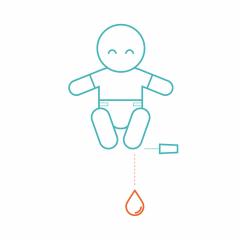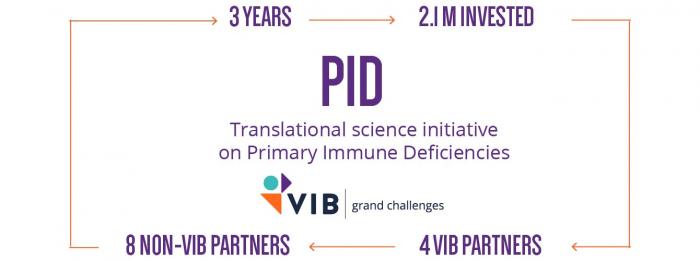PID Project
The VIB-GCP PID-consortium will address the urgent need for mechanistic understanding and molecular diagnostic tools to better stratify PID patients and guide therapeutic decisions in the clinic. Additionally, research of novel targeted therapeutic concepts based on deep insight in the core immunological and molecular mechanisms driving specific PIDs will expand therapeutic options available to physicians and their patients. Not only will this have important and immediate impact on the life of affected patients, it will also have tremendous scientific impact in reverse translational research.

Screening of suspected PID patients
Patients with a suspected PID are screened at the hospital using conventional tests. When these tests fail to deliver candidate genes, an in-depth characterization of the PID genotype is initiated.

Detection of rare or novel PID disorders
Standardized high-throughput screening of potential PID patients combined with immunophenotyping and whole-genome genetic analyses are applied to detect rare or novel PID disorders. The deep insight in the core immunological and molecular mechanisms driving the specific PID will expand therapeutic options available to physicians and their patients.

In vivo validation
Reliable and powerful methods will be established to generate patient-specific laboratory model systems (cellular and murine). These patient-specific model systems will be utilised to test innovative patient-specific treatments (e.g. drug repurposing).

PID newborn screening program in Belgium
Concomitantly, the project also aims to start a PID newborn screening program in Belgium to detect PID in an early stage. This will be done using a heel-pricked drop of dried blood on a Guthrie Card (kind of tissue paper) and blood analysis. PID screening was recently added to the list of soon to be implemented newborn screening programs by the government (after technical validation).
The VIB-GCP PID-consortium will address the urgent need for mechanistic understanding and molecular diagnostic tools to better stratify PID patients and guide therapeutic decisions in the clinic. Additionally, research of novel targeted therapeutic concepts based on deep insight in the core immunological and molecular mechanisms driving specific PID will expand therapeutic options available to physicians and their patients. Not only will this have important and immediate impact on the life of affected patients, it will also have tremendous scientific impact in reverse translational research.

